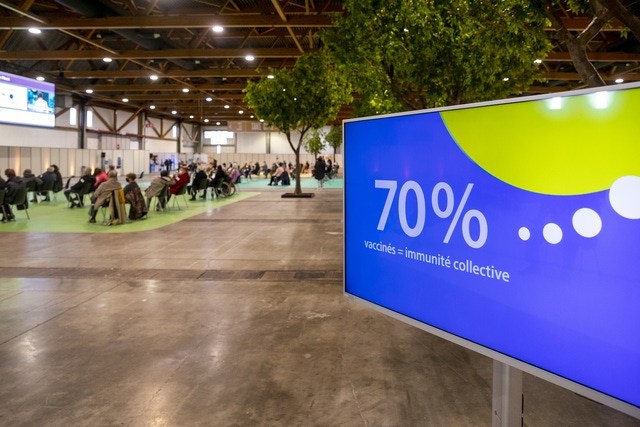The vaccination coverage rate in Brussels continues its struggle to reach the levels seen in other Belgian regions, but according to Inge Neven, head of the Brussels Health Inspectorate, its rate should instead be compared with that of other big cities.
In Brussels Region, 59% of the adult population is fully vaccinated, putting it far behind Flanders (87%), Wallonia (77%), and the German-speaking region (72%).
"Of course, we want to increase the coverage rate and I am sure we will, but we have to make sure that we don't compare apples to oranges, and that we instead make a comparison between Brussels and a similar region," she told The Brussels Times.
She argued that the rate will likely never be as high as in Flanders, but said that "you can't compare Flanders and Wallonia with Brussels, which are rural regions as opposed to a metropolis."
"I think we should compare it with other big cities, and not with Copenhagen or Vienna, but with New York or the suburbs of Paris, where there is the same socio-economic situation," Neven said, adding that Brussels' levels are more or less the same as those in these large metropoles.
Lowest rate in Europe
However, a recent comparison of cities showed the vaccination rate is lower in the Brussels region than anywhere else in Western Europe.
According to virologist Marc Van Ranst (KU Leuven), the argument that Brussels has a hard time because it is a big city "now becomes more difficult," as Brussels also scores the worst of all Western European capitals.
For instance, the region doesn't score as well as the Paris region, nor Amsterdam and Berlin where 67% and 62% are partly vaccinated, respectively.
Related News
- People with weakened immune system to get third coronavirus dose
- Covid-19: New infections approach 2,000 a day
- Returning travellers make up a third of all Brussels Covid cases
Van Ranst admitted that "there are people in Brussels who are doing their utmost to go from door to door persuading people to get vaccinated, but now we have to admit that too few people are doing that."
In the meantime, various opposition and government parties are calling for an urgent meeting of the Health Committee in Brussels’ Parliament to tackle the slow vaccination rollout in the capital region.
One of the ministers asking for an urgent meeting, Bianca Debaets from Flemish centrist CD&V parties, argued that the low pace of vaccination in Brussels “risks undermining the national strategy to end the crisis."
"In the fight against COVID, every day counts. Brussels has already lost too many," she said.
When it comes to stepping up efforts to combat infections, Neven said that Federal Health minister Frank Vandenbroucke's announcement that he will discuss mandatory vaccination for health care staff with the federal government is already a good start, and will certainly help increase the vaccination rate.
Reaching communities
Neven stressed that the capital is doing everything it can and new initiatives to increase the vaccination rate are constantly being organised.
"We are increasingly focusing on local actions, which started in April and which we will continue to deploy. We have set up various vaccination possibilities in communities, and although these were on hold during the holidays, they will be restarting," she said.
Meanwhile, the region’s Joint Community Commission (Cocom) is preparing actions to vaccinate children in schools from September.
"The intention now is that we will work hard at the beginning of the school year to make sure that we can organise some kind of initiative in schools to get a higher vaccination rate," she said.
Vandenbroucke had already said he is working with the competent pupil guidance centres to administer vaccinations through school systems.
“I strongly advocate the use of schools for vaccination. Not only to reach and convince young people but also to ensure that the vaccines are offered,” he said.
Neven said that preparations are already underway to implement initiatives in schools and that from 1 September, they can help raise awareness and communicate the importance of coronavirus vaccination.
"But we also want to vaccinate in the schools themselves, and of course, all these actions are now strengthened by Vandenbroucke's message," she said.
The region received criticism for closing the region's largest vaccination centre, Heysel, whilst the vaccination coverage rate was still below that of other regions. However, Never argued that there are still plenty of ways to get vaccinated.
"Four vaccination centres will remain open, closer to the centre of Brussels so it is more easily accessible, and they have the capacity to vaccinate people who still want it," Neven added.

